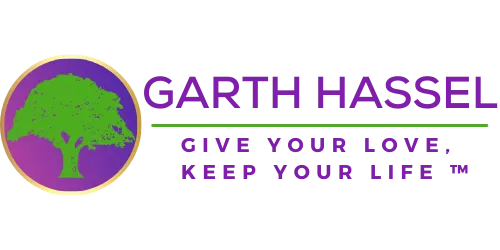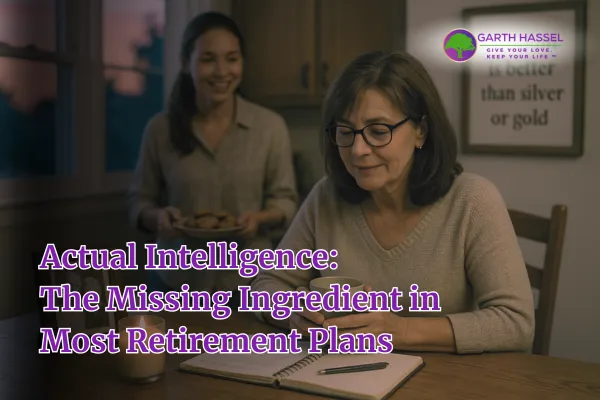



Actual Intelligence: The Missing Ingredient in Most Retirement Plans
Let’s get something straight: I like technology. I use it every day. But when it comes to the real work of retirement planning—especially the kind that prepares you for your most vulnerable years—there’s one thing tech can’t touch:
Actual Intelligence.
I’m not talking about IQ or spreadsheets. I’m talking about the kind of wisdom that comes from living a real life.
From saying yes when it mattered—and no when it was hard.
From carrying more than your fair share, and still showing up for your Loved Ones.
Planning Requires Assumptions—But Wisdom Sets the Priorities
Let’s face it: Every retirement plan is built on assumptions.
How long you’ll live.
What inflation will do.
Whether your kids will need help—or your parents will need more than you expected.
And that’s where most “gurus” get it wrong. They treat planning like it’s only “5th-grade” math.
But the truth is, your spreadsheet doesn’t know that your mom’s dementia diagnosis changed everything.
Your algorithm doesn’t feel the squeeze of caregiving between your job and your daughter’s senior year.
Only Actual Intelligence “in context”—your lived experience—can guide those kinds of decisions with grace.
AI Can’t Build Community—But You Can
Let me say this gently: AI can’t cry with you.
It can’t sit beside you when you’re scared.
It doesn’t know what it feels like to wonder, “Who’s going to take care of me when I can’t anymore?”
Wisdom-driven planning is best done in community—with people who’ve been there, or who are walking it with you now.
We don’t need more followers or more data. We need more kitchen table conversations. More courage to say,
“I don’t have all the answers—but I know I need a plan.”
And we need spaces where those conversations can actually happen.
So, Let Me Ask You:
If you created a community to support you leading into your most vulnerable years,
what would it look or feel like?
Would it be supportive?
Private?
Insightful?
Would there be laughter in the middle of the hard stuff?
I’m not asking for me..
I’m asking for the woman reading this who doesn’t yet realize she’s not alone.
Want to share your vision? Email me directly HERE. Let’s build something wiser together.
HOMESCHOOLING: Haven or Havoc?
Your child's school years are precious and fleeting.

Now could be your best time to step up where your school is letting your child down. Let this series of myth-busting short chapters encourage you.

2 Major Mistakes
Which one will you make?

Which of these 2 retirement mistakes are you making right now? It's impossible to entirely avoid both mistakes.
You won't know for sure which mistake will work out better for you until it's too late.
How to choose?

Finding the Will
(Part 1)
Part 1: Have the will to arrange for a smooth transition when you’re no longer around to answer questions

Have the will to arrange for a smooth transition when you’re no longer around to answer questions (Part 1)
Ensuring your children or other Loved Ones can readily access your important papers when you die entails a sound process versus one or two conversations. You must overcome aversion to the subject of death, procrastination of anything that is long-term, and the tendency to assume things will be fine. Family dynamics can be sweet, spicy, or dicey.

Finding the Will
(Part 2)
Part 2: Getting Organized

While the internet permits convenient access to accounts, policies, and stored documents, it presents a plethora of password management problems. which too many people avoid by succumbing to password laziness, such as:
- re-using passwords for multiple logins, or
- use simple, easy to remember passwords, or
- writing them on sticky notes placed on their monitor or under their keyboard, or
- keeping them in a spreadsheet on their computer, or
- letting their browser remember passwords for them

Embrace Your Clarence

Is Clarence your future?
Golden insight from a golden retriever.

Post-Pandemic W.E.L.L.ness
Working, Earning, Learning, and Launching to Thrive

Where life drastically changed forever two years ago, everyone adjusted to the best of their abilities.
Here are a few of the key adjustments--"pandemic pivots"--that sustained some and prospered others.

Prenuptial Adulting
Equip Them for Happily Ever After

“Mom, Dad, we’re getting married!"
“Wonderful, congratulations! Here’s what you both need to do first.”
Equipping newlyweds with essentials of responsibility leaves plenty of life yet to be discovered on their own. Adults understand that love isn’t oogly feelings; it’s a hard choice. It’s putting your commitments and your money where your mouth is.
Many of the following steps also apply to one’s turning 18 years old. Becoming engaged adds urgency and a deadline.

Rethinking Competing Funds for College and Retirement

We live in a time of skyrocketing inflation topping decades of unbridled higher education costs.
Is the tension between funding your retirement and funding (at least partially) your children’s college education keeping you up at night?
You’re not alone.

Married? Is Your Endgame 100% or Just 50%?
Are you single? That other 50% could be whoever is most important to you.

Multiple unforgiving players factor into your retirement and estate plans (collectively your “endgame”). Household names include the Internal Revenue Service, the Social Security Administration, and the Center for Medicare and Medicaid Services. Key decisions with these players are nearly impossible to reverse. Plus, if you qualify for a pension, how you activate it is another irreversible decision.
Are you more of a planner than your spouse? It’s all too common for one spouse to blindly trust the planning spouse. Countless endgame “plans” were created by 50% of a couple:



